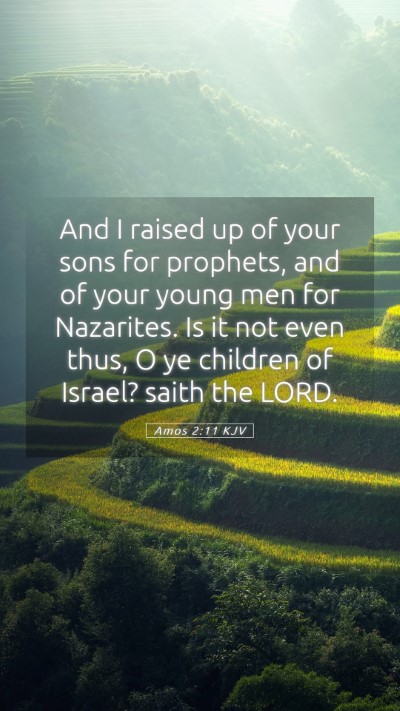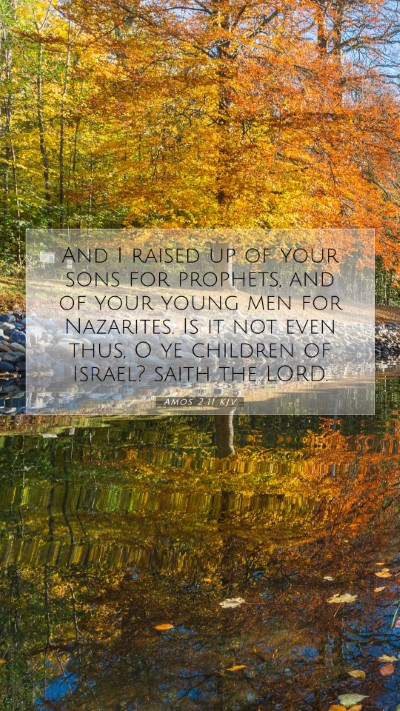Old Testament
Genesis Exodus Leviticus Numbers Deuteronomy Joshua Judges Ruth 1 Samuel 2 Samuel 1 Kings 2 Kings 1 Chronicles 2 Chronicles Ezra Nehemiah Esther Job Psalms Proverbs Ecclesiastes Song of Solomon Isaiah Jeremiah Lamentations Ezekiel Daniel Hosea Joel Amos Obadiah Jonah Micah Nahum Habakkuk Zephaniah Haggai Zechariah MalachiAmos 2:11 Meaning
What is the meaning of Amos 2:11?
And I raised up of your sons for prophets, and of your young men for Nazarites. Is it not even thus, O ye children of Israel? saith the LORD.
Amos 2:11 Bible Verse Meaning
Understanding Amos 2:11 - Bible Verse Meanings and Interpretations
The verse Amos 2:11 states: "And I raised up of your sons for prophets, and of your young men for Nazarites. Is it not even thus, O ye children of Israel? saith the LORD."
Context and Background
This verse is part of a larger prophetic discourse where Amos, a shepherd and fig farmer from Tekoa, delivers God’s message of judgment towards Israel due to their transgressions. Amos emphasizes the covenant relationship between God and Israel, noting that God had appointed prophets among them to guide and instruct them.
Commentary Insights
-
Matthew Henry's Commentary:
Henry emphasizes that God’s appointment of prophets and Nazarites was a demonstration of divine grace, as He sought to guide His people back to righteousness. This clearly indicates God's desire for their repentance and restoration. The mention of sons as prophets suggests that God had provided sufficient witnesses to His truth.
-
Albert Barnes' Commentary:
Barnes points out the significance of the Nazarites, who were set apart for a dedicated service to God. This signifies not only the call to holiness but also a call to reflect on the privileges and responsibilities that come with being chosen by God. Their rejection of these prophets and Nazarites showcases the people's indifference to divine calls for righteousness.
-
Adam Clarke's Commentary:
Clarke elaborates on the role of the prophets and Nazarites, explaining that their purpose was to present God’s teachings and laws to the people. His analysis highlights how these roles were crucial for Israel's spiritual well-being, and their neglect exemplified a deeper moral decline, warranting God's judgment.
Theological Implications
The verse invites readers to consider the nature of God’s communication with His people. It reveals His willingness to raise messengers who stand as intermediaries to encourage a faithful relationship. This reflects the broader theme found in Scripture regarding God’s persistent pursuit of humanity despite persistent rebellion.
Bible Study Insights
For those engaging in Bible study groups or online Bible study sessions, this verse can open discussions on the importance of responding to divine callings, the role of prophets in the Old Testament, and how today’s believers can relate to this ancient warning. It raises questions such as:
- What are the contemporary equivalents of prophets in today's world?
- How can we identify God’s voice among numerous distractions?
- What does it mean to be set apart, like the Nazarites, in our current society?
Cross References
- Numbers 6:1-21 - Discusses the Nazirite vow and its implications.
- Jeremiah 1:5 - God’s call of prophets before birth indicates divine purpose.
- Acts 2:17 - Reference to God's promise of pouring out His Spirit on all flesh, indicating a continued practice of prophecy.
Application of the Verse
The takeaways from Amos 2:11 for modern believers include the significance of heeding divine instruction and the importance of spiritual leadership in guiding God’s people. As we reflect on this scripture, we should consider how to apply these lessons in our lives:
- Listening to Spiritual Leaders: Recognize and respect those who remind us of God's truth.
- Setting Ourselves Apart: Aim to live lives of holiness and dedication similar to the Nazarites.
- Responding to God's Call: Be proactive in discovering and acting upon God’s call to service, whether in ministry or vocation.
Conclusion
Amos 2:11 serves as a powerful reminder of God’s commitment to guide His people through appointed messengers. Understanding this verse deepens our Bible verse interpretations and encourages believers to engage actively with scripture in their personal and communal spiritual journeys.


